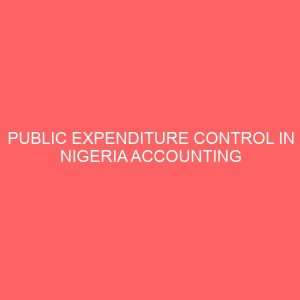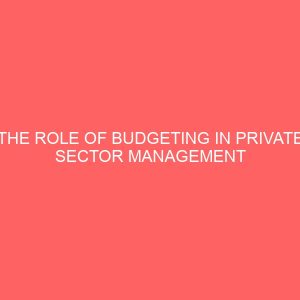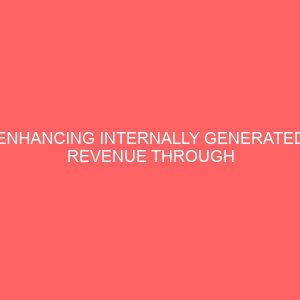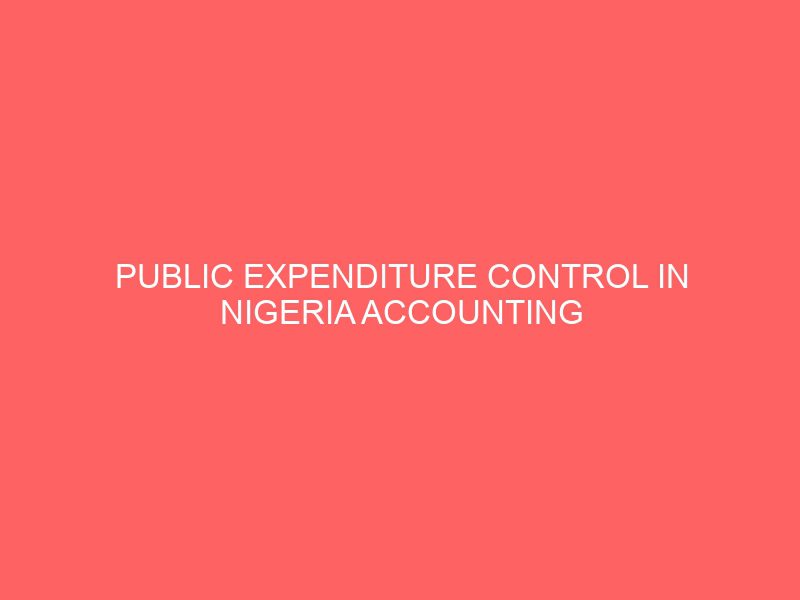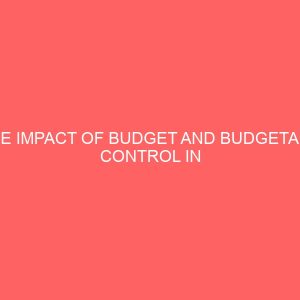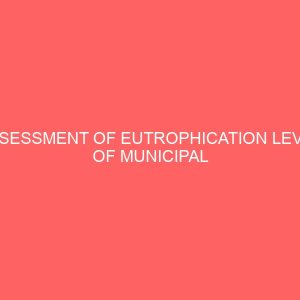Description
PUBLIC EXPENDITURE CONTROL IN NIGERIA ACCOUNTING (A CASE STUDY OFACCESS BANK OF NIGERIA)
CHAPTER ONE
INTRODUCTION
1.1 BACKGROUND OF THE STUDY
This research is on Public expenditure control in Nigeria accounting (a case study of access bank of Nigeria). Public expenditure is the spending made by the government of a country on the collective needs and wants of her citizenries such as spending on; the provision of infrastructures, pension provision etc. Until the 19th century, Public expenditure was limited as Laissez faire philosophies which believed that money left in private could bring better returns. In the 20th Century John Maynard Keyness argued the role of Public Expenditure in determining levels of income and distribution in the economy. Since then government expenditures has shown an increasing trend. In the 17th and the 18th Century Public Expenditure was considered as wastage of money. Thinkers are of the view that Government should stay with their traditional functions of spending on defense and maintaining law and other.
Public Expenditures are incurred through budget implementation. The macro-economic goals of the state budget are administered in specific and complex systems which were developed in the managerial information unit of the General Accounting department under the name of “Budget Implementation macro system” The role of accounting in the control of public expenditures relates mostly on setting of standards via budgeting and ensuring that the standard set are adhered to. The accounting controls also ensure the actualization of the macro-economic goals which are viz:
- Maintaining the total framework of the planned expenses.
- Adjustment of expenditure rate to the rate of the reception of incomes.
- Regular follow-up of compliance with deficit goals.
- Planning of the financing of the deficit in order to reduce the national debt-product ratio etc.
In Nigeria, public enterprises are engaged in a wide spectrum of economic activities including agriculture, mining, construction, manufacturing commerce and services. The classification of public enterprises in Nigeria has been made according to varieties of criteria by different authorities. The Public Service review commission (1975:101) classified public sector into:
- Public Utilities
- Regulatory of Service body
- Financial Institutions
- Commercial and Industrial Enterprises.
Nigeria being a mixed enterprises. Eze (2013) opined that a firm is classified as private enterprises when it is funded, owned and managed by an individual or group of individuals.
These firms are expected to be registered in the state within which they operate. The activities of the public enterprises have been on the increase in recent times which necessitated the introduction of the accounting to check and monitor the financial activities of these enterprises.
According to Onyekwelu (2010:2) Accounting is defined as the process by which data relating to the economic activities of an organization are measured, recorded and communicated to interested parties for making informed decision. The earliest methods of accounting records were kept in physical quantities. These records came from Eastern early civilization which involved countries around the Mediterranean sea such as Mesopotamia, Egypt, Greece Italy etc. Money was recorded as soon as it was received. Money took the place of barter as a medium of exchange and unit of account. This practice has been closely related to economic development of countries. If the operation of Public enterprise grow in size and complexity, management and other stakeholders will like to be informed on the enterprise’s operation. Accounting is the only means via which such information which are financial in nature can be communicated to the stakeholders.
The role of accounting in enterprises in Nigeria is primary to ensure accurate accountability in these sectors and true and fair financial position of the enterprise. This role is of utmost importance in any organization. An organization can only grow or profit when the resources at its disposal are well managed. The role of accounting seems to be more pronounced public enterprises. In recent times, there are cases of mis-appropriation of funds in the public enterprises and improper accountability. These factors have led to a lot of public enterprises into oblivion, if the government had recognized the role of accounting all most of the problems witnessed would not have occurred. No Enterprise can move forward without having a well-organized and functional account department which will provide accurate financial information for the Enterprise and other interest group(s).
In summary, the role of accounting in the control of public expenditure deals with the process of setting cost standards and ensuring that the standard set are maintained, However, if the already set standards appear to be in realistic such standard can be reviewed and adjusted for it to be more realistic. Control of public expenditure can be done through adequate budget implementation.
1.2 STATEMENT OF PROBLEM
The amount of public expenditure to be incurred by the government in any fiscal year is contained in the annual budget. It is the goal of government to maintain balanced budget, but many countries especially the developing ones have rather witnessed budget deficit this implies excess of expenditure over revenue. The resources to finance this deficit are always unavailable and most government has failed to acknowledge the need for adequate forecasting and adjustment of forecast to ensure that a balanced budget is attained.
There are increasing cases of financial mismanagement and misappropriation in virtually all public enterprises in Nigeria, this is occasioned by non-existence of proper accounting system that will ensure accountability and transparency in the execution of public expenditures. Furthermore, non-application of standard costing during forecasting by public administrators has made the control of public expenditures a difficult task. Standard costing, which is a good accounting technique for cost forecasting and control has not been adopted by public administrator hence, there are numerous cases or incidents of unfavorable or adverse variance between the budgeted or standard amount of public expenditure and the actual amount of public expenditure. Thus, there is need to evaluate the role of accounting in the control of public expenditure in Nigeria.
1.3 OBJECTIVES OF STUDY
The aim of this research work in general is to vividly evaluate the role of accounting in the control of public expenditures in Nigeria. The specific objectives for this research work are:
- To ascertain whether adequate government budgeting can regulate public expenditures and improve the productivity of public expenditures.
- To ascertain whether an effective and efficient accounting system in public institutions can ensure accountability and transparency in the execution of public expenditures.
- To evaluate the impact of standard costing on the control of public expenditures and also on the productivity of public expenditures when adopted by public institution administrators.
1.4 RESEARCH QUESTIONS
- How can adequate government budgeting regulate public expenditures and improve its productivity?
- How does an effective and efficient accounting system guarantee transparency and accountability in the execution of public expenditures?
- How does the application of standard costing in the administration of public institutions regulate public expenditures and enhance the productivity of such expenditures?
1.4 RESEARCH HYPOTHESES
HYPOTHESIS ONE
H0 – Adequate government budgeting does not regulate public
Expenditures and improve the productivity of public expenditures.
HYPOTHESIS TWO
H0 – Effective and efficient accounting system in public institution
Does not ensure transparency and accountability in the execution of public expenditures.
HYPOTHESIS THREE
H0 – Application of standard costing in the management of public
institution will not enhance the regulation of public expenditure and its productivity.
1.5 SIGNIFICANCE OF THE STUDY
This research work which focuses on the impact or role of accounting in the control of public expenditure in Nigeria will be of great importance to federal, state and local governments who are basically responsible for incurring public expenditure.
This is because this research work will awaken their consciousness on the enormous role accounting plays on the control of public expenditures.
This research will also be of great importance to administrators of public institutions who before now may be ignorant of the roles accounting plays in ensuring transparency and accountability in the execution of public expenditures.
Finally, this research will also serve as a stepping stone for students of institution of higher learning who may be researching on similar or topic related to this. It could help precisely on the review of related literature.
1.6 SCOPE AND LIMITATIONS OF THE STUDY
In the course of this research the researcher examined the role of accounting in the control of public expenditure in Nigeria. However, this research covered only the Access Bank of Nigeria, Enugu branch.
This research work is not free of limiting factors. The researcher was constrained by the following factors:
FINANCE: Previously, research project such as this use to be a joint or group work, but now is embarked upon individually. Thus, the meager fund at the disposal of the researcher constrained her from extending the research to other branches. Some other public (government) establishment in addition to the Access bank would have been visited by the researcher if not for this constraint.
SCARCITY OF RELATED LITERATURE: Most of the libraries visited lacked journals with articles related to the topic of this study. Even when there is related article, such article will not give detailed analysis of the topic. More so, there is scarcity of already made research on this topic. Although one was gotten in the course of the research for it, but its contents were insufficient for this study. All of these constrained the research from making intense analysis.
STAFF NON COORPERATION: The uncooperative attitude of some of the staff of the Access bank of Nigeria, Enugu in terms of releasing data constituted a major setback for the researcher. Most of the staff is not willing to let out some of the needed data for this research.
1.7 DEFINITION OF TERMS
PUBLIC EXPENDITURE: Okwo (2011:40) defined it as the spending made by the government of a country on the collective needs and wants of her citizenry. It normally leads to the provision of infrastructures.
ACCOUNTING: Onyekwelu (2010:2) defined it as the process by which data relating to economic activities of an organizational are measured recorded summarized interpreted and communicated to users to enable them make informed decisions.
STANDARD COSTING: Nweze (2014:80) defined it as a system of cost accounting which makes use of predetermined cost relating to each element of cost layout, material and overhead for each line of product manufactured or service supplied.
BUDGETING: Adeniji (2009) defined it as the processes involved in making a budget. That is the act of constructing a budget.
BUDGET: Adeniji(2009:596) defined it as a financial summary of estimated incomes and expenditure of government for a fiscal year.
BUDGET IMPLEMENTATION: The is defined as the execution of budget through either revenue generation or public expenditure.
BUDGETARY CONTROL: This is the methodical control of an organization’s operations through establishment of standards and targets regarding income and expenditure and a continuous monitoring and adjustment of performance against them.
ACCOUNTING CONTROLS: These are measures instilled by a good accounting system to ensure accurate recording of transaction, adherence to rules, safety of assets and accuracy of financial statement.
ACCOUNTING SYSTEM: This is defined as an organized set of manual and computerized accounting methods, procedures and controls established to gather, record, classify, analyze, summarize, internet and present accurate and timely financial data for management decisions.
PUBLIC INSTITUTION: This is defined as an institution or organization owned and majority managed by the government for the interest of the general public.
ADMINISTRATOR: This is an individual who administers affairs, one who directs, manages, executes or dispenses, whether in civil judicial, political or ecclesiastical affairs. He is also known as a manager.
MIXED ECONOMY: This is defined by Udeabah (2004:22) as an economic system in which public and private ownership of means of production exist and in which government participates extensively in the regulation management and supervision of economic activities.
PRODUCTIVITY OF PUBLIC EXPENDITURE: This is defined as the ability of government expenditure to yield the required outcome for which such expenditure was incurred.

